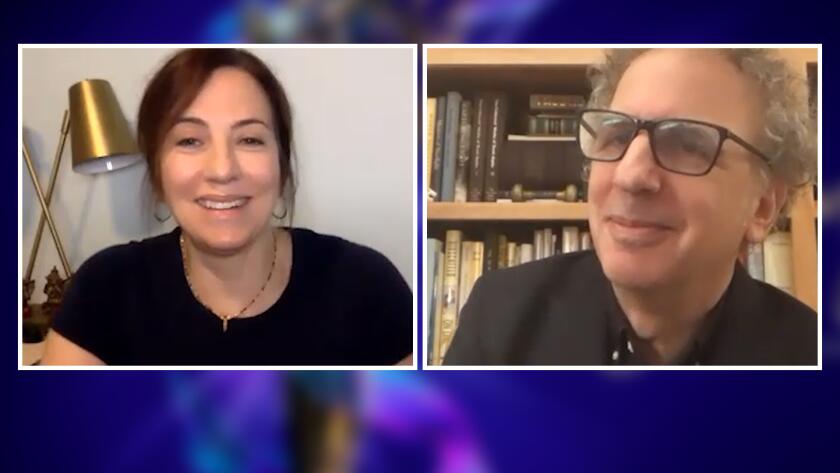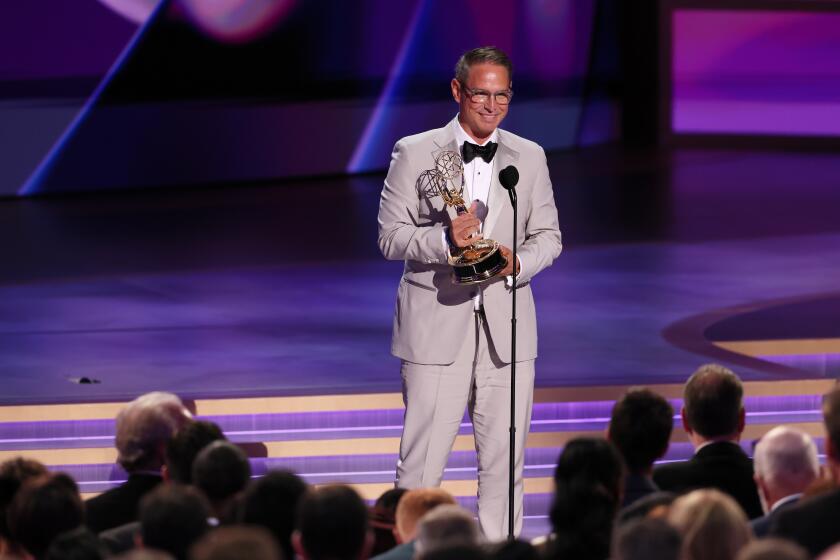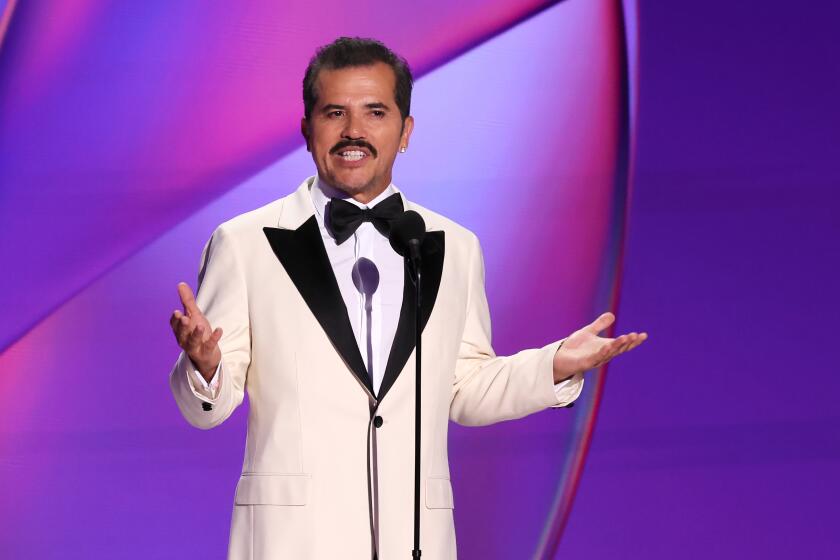Review: Strangest Emmys ever? Sure, but surprising, intimate and delightful too
- Share via
Good or bad, there was no way the 72nd Emmy Awards, which went on Sunday from the Staples Center in Los Angeles and living rooms around the country and beyond, wasn’t going to be interesting.
And it was good, by and large an elegant, intelligent solution to making ceremonial television in light of Our Great Shared Obstacle. That isn’t to say that every joke worked, and latency does make shtick difficult to do remotely, but the telecast, which mixed live and recorded pieces, felt solid enough to accommodate the occasional technical difficulty. Because most every moment was unprecedented, not merely a slight variation of something we’d seen before, it was minute for minute more interesting than these long nights of self-celebration usually are.
The evening began with a sort of feint, with host Jimmy Kimmel coming on to canned applause and delivering jokes to star-studded reaction shots flown in from Emmy broadcasts of years past. What seemed like a very bad idea was eventually flipped when he spotted himself in one of these shots, and the veil of unreality gave way to the strangely more comforting view of a great empty space. (“Of course I’m here all alone, of course we don’t have an audience. This isn’t a MAGA rally.”) A nice bit with Jason Bateman sneaking into the arena by impersonating his own cardboard cutout followed. (“I want to be here. … It’s ritzy. … I want to eat shrimp with the cast of ‘The Crown,’ I want Mario Lopez to ask me about my pants.”)
In most years, the host comes on at the beginning of the show, delivers a monologue (some of which addresses the celebrities arrayed before him — and it is usually a him) and then returns a few times throughout the evening to let you know he exists. Much of the evening is run by disembodied announcers. This year, Kimmel, who has twice before hosted the old-world Emmys (and twice hosted the Oscars), was a presence from first to last, assisted by DJ D-Nice, who was both the band and the evening’s other consistent voice.
Emmys 2020
Kimmel announced some awards himself, doing a little scripted banter with presenters, who came alone and not in pairs. Jennifer Aniston, nominated for “The Morning Show,” joined him in presenting the evening’s first award — for comedy actress, won by Catherine O’Hara, beginning the “Schitt’s Creek” sweep of the first hour. Kimmel and Aniston’s routine about sanitizing the envelope ended with fire, perhaps more than was planned. Later, she appeared remotely, via video, alongside Courteney Cox and Lisa Kudrow in a we-share-an-apartment joke. (See: latency, above.)
- Share via
Weary TV critics Lorraine Ali and Robert Lloyd stayed up past deadline to break down why the stay-at-home awards show was a winner.
It is unusual, of course, to be doing these things to an empty space, but not as strange as it once was. One can wonder whether the slight, polite laughter that greets a poor joke is is better than no laughter at all. Kimmel and other late-night hosts have been playing in that reaction-free space for months now; indeed, it feels more normal than not. He was the right guy for the job, in any case — a walking dose of normality.
Cameras had been distributed to nominees to participate remotely from wherever, and once again we were on strangely intimate terms with famous strangers. Most nominees dressed up a little, and some a lot. Many with family, or colleagues; sometimes masked, a little alarming when not. (The distressed viewer tells himself all tested negative two weeks before.)
The group reactions around the winners (and even the losers), whose loved ones sometimes remained by their side through a speech, was reliably delightful to behold. Most Hollywood awards are about mystification, the fog of glamour that a joke might skewer but that the enterprise as a whole wants to maintain. Sunday’s felt sufficiently glossy. The set, a video-screen-filled cylinder with a big Emmy statue at the center, both contained and outward looking — pretty much a metaphor for all our lives. It was rendered in the mothership-blue that characterizes such sets. Most everyone who appeared at Staples was dressed to the nines.
Given the world we’re living in and the circumstances of the ceremony, there was a political tone to the evening, though in some ways subtler than one might have expected — possibly because people were speaking to cameras a few feet away and not into the space of a big theater, and possibly for reasons of positivity. (I caught Trump’s name only once — by “Succession” creator Jesse Armstrong, who spoke from London and “unthanked” the president along with the coronavirus, Boris Johnson, nationalist governments and “the media moguls who do so much to keep them in power.”)
But there was no shying away from that reality. The evening’s best innovation was to turn ordinary essential workers into presenters, in filmed segments that brought the world into Hollywood, not (merely) to braise it, but to be praised. It was the inversion the year required.
More to Read
The complete guide to home viewing
Get Screen Gab for everything about the TV shows and streaming movies everyone’s talking about.
You may occasionally receive promotional content from the Los Angeles Times.








